 Hobby Lobby is a huge, rich
Hobby Lobby is a huge, rich corporation “person” that wants to control more than the place you buy your craft supplies and birth control. They seem to have their fingers in lots of different evangelical pies. It is actually pretty confusing to try and follow everything they are into; but it is certain that they want to implement a hardline evangelical agenda on many fronts and these include a mammoth collection of ancient biblical manuscripts, a National Bible Museum, public school textbooks, and a whole lot more. Continue reading
Rumpofsteelskin
I have watched a lot of movies where Americans visit in a foreign country, run into serious trouble, and inevitably go to the American Embassy for help. Usually these are in war or action movies where people fear for their lives, but even so, such movies have I think, instilled in my imagination an unrealistic picture of what an embassy, and particularly the American Embassy can and can’t do. A recent (actually on going) experience in a foreign country, lets call it Bangladesh Pleasantville, made me realize how truly naive I am about how helpful the embassy would or could be for its citizens (well in my case I am a permanent resident with an American family). Continue reading
The chief minister of Gujarat and alleged human rights abuser Narendra Modi was dropped from the lineup at the 17th Wharton India Economic Forum thanks to internal pressure from professors and students at Wharton and from pressure outside. The petition signed by students and faculty was spearheaded by the Kractivist.
Geez Wharton. What were you thinking? Continue reading
The chief minister of Gujarat, Narendra Modi, will be a keynote speaker at an upcoming conference sponsored by the Wharton School of Business at their 17th Wharton India Economic Forum and held at the Penn Museum at the University of Pennsylvania in Philadelphia.
So who the hell is Modi and why should you care? He is accused by some of genocide in the 2002 Gujarati riots for one. General oppressor, religious bigot, and despot, for another. But he can charm your socks off, was on the cover of Time magazine, and has more charisma than Bill Clinton according to the Atlantic Wire. Continue reading
Abstract:
A couple of nights ago a number of us conducted a Scientific survey about the number of bottles of wine that the average Crasstalk commentator drinks in any given week. From as little as one glass a week to several boxes was the result. Some of our scientists even suggested that “boxes” or “boiîtes” would be better units of measures to yield more accurate results from our gang of drunks sample community. Continue reading
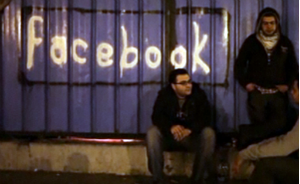 Ever think that Tweet or Facebook status or Crasstalk comment is just going out into the webosphere void to be swallowed up and eventually forgotten? In most cases we pray for this after a night of drunken internet ramblings. Or do you ever think you are just wasting your time writing into this void that gives you so little in return? Well fear not! You can now rest assured that many libraries are on the job making sure that your contribution to the “social memory” of our times is being preserved for future generations! Continue reading
Ever think that Tweet or Facebook status or Crasstalk comment is just going out into the webosphere void to be swallowed up and eventually forgotten? In most cases we pray for this after a night of drunken internet ramblings. Or do you ever think you are just wasting your time writing into this void that gives you so little in return? Well fear not! You can now rest assured that many libraries are on the job making sure that your contribution to the “social memory” of our times is being preserved for future generations! Continue reading
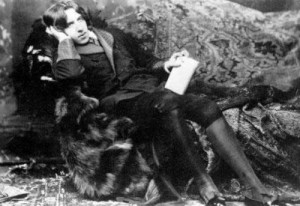 Wilde, Oscar, 1854-1900 (Spirit),
Wilde, Oscar, 1854-1900 (Spirit),
Oscar Wilde from purgatory, 1926.
– OCLC Connexion (Library of Congress authority file)
Recently I started a job that requires me to do some work with the Library of Congress database, using a program called OCLC Connexion. While generally as efficient as it is grey and austere, I was delighted to learn about one of its features that is not readily known to the general public.
Did you know that the Library of Congress (LC), which sets the standard of all library catalogs across the land, has a classification for ghost writers? And when I say “ghost writers,” I don’t mean your typical words-for-cash ghost writer, I mean actual ghosts! Continue reading
Currently there is a new book on Gandhi making its rounds on the internet review circuit, Joseph Lelyveld’s Great Soul: Mahatma Gandhi and His Struggle with India. Initially the book generated a number of “controversial” reviews that focused on sexual scandal, bisexuality, and racism allegedly related to this modern Hindu icon. Outrage!
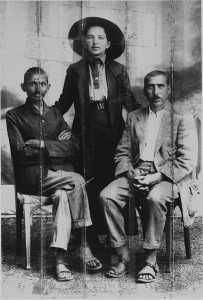
Here are some examples: “Outrage in India over new biography that depicts Gandhi as racist, bisexual” or “Outrage over claims of Mahatma Gandhi being bisexual.”
Interestingly, now, a number of articles are coming out about the reviews themselves in the very circular way such things work in cyberspace. The Times of India: “Outrage over reviews of new Gandhi book”; the Economic Times supplement: “Outrage over reviews of Joseph Lelyveld’s ‘Mahatma Gandhi and His Struggle with India.”
The New York Times, where Lelyveld once held an elite position, just plain plays softball: “Appreciating Gandhi Through His Human Side.”
I will only discuss a couple of examples cited in the reviews and one from Google Book Previews (I am currently still waiting for the book to arrive ). While the book is still in the public eye, however, I want to say a few things about what I call the Cycle of Outrage that the book is being subjected to and offer examples of other books about Indian religious icons that have undergone this treatment. What can we expect to happen with Lelyveld’s contribution?
It seems inevitable that when you explore the human and especially the sexual lives of modern Hindu figures, you inevitably run into a shit storm disproportionate to the offering, especially from the religious right (sometimes referred to as Hindutva). The shit storm may amount to very little, like bad Amazon reviews, but it may take a darker turn and include vandalism and/or death threats. We will blame the internet, right-wing politicing, and mob mentality.
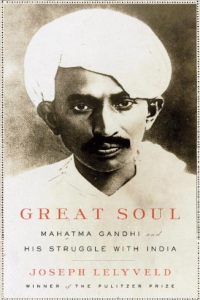 So here is some of the dirt on the book Great Soul. The author, Lelyveld, is a former executive editor of the New York Times, had a long career as a journalist and writer, and has lived and traveled throughout Asia and Africa. A 2005 overview of his career can be read here. Lelyveld draws primarily from Gandhi’s autobiography and journals, and from his own journalistic legwork in South Africa stretching back to the 1960s. Lelyveld revisits some of Gandhi’s old haunts as well as explores his enduring reputation there (a monument of Gandhi erected in Durban is contrasted to a McDonald’s restaurant built on top of a vegetarian restaurant he frequented).
So here is some of the dirt on the book Great Soul. The author, Lelyveld, is a former executive editor of the New York Times, had a long career as a journalist and writer, and has lived and traveled throughout Asia and Africa. A 2005 overview of his career can be read here. Lelyveld draws primarily from Gandhi’s autobiography and journals, and from his own journalistic legwork in South Africa stretching back to the 1960s. Lelyveld revisits some of Gandhi’s old haunts as well as explores his enduring reputation there (a monument of Gandhi erected in Durban is contrasted to a McDonald’s restaurant built on top of a vegetarian restaurant he frequented).
Gandhi and Race
Lelyveld is accused of characterizing Gandhi as “racist.” The term is found three times in the book, most emphatically when describing his attitude towards Gandhi’s views of South Africans. He refers, for example, to a well known quote about Gandhi’s strong feelings on the “mixing of the Kaffirs with the Indians” (just Google this phrase to see its extensive use). And while he does suggest that Gandhi’s language is racist, the sage’s controversial views on race have long been known, so this charge against Lelyveld seems a little unfair since this view is not unique to him. Outrage!
Gandhi, Vows, and Sex
Early on, Lelyveld hones in on Gandhi’s vow of brahmacharya, basically a Hindu vow of celibacy, and his subsequent struggles with it. Gandhi takes a particular approach to this vow that is inspired from his reading of the Bhagavad Gita – be detached from this world but remain engaged with it (that is, don’t run away to a cave or mountain top). 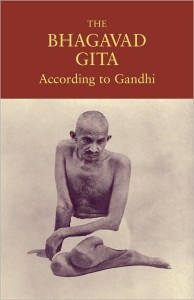 The result is a politically active renunciant. It is the “struggles” as they are portrayed by Lelyveld and as they are (more importantly) filtered through the online reviews, that are primarily the source of the outrage.
The result is a politically active renunciant. It is the “struggles” as they are portrayed by Lelyveld and as they are (more importantly) filtered through the online reviews, that are primarily the source of the outrage.
Gandhi’s view of sex is presented as follows: “Gandhi held to a traditional Hindu idea that a man is weakened by any loss of semen–a view aspiring boxers and their trainers are sometimes said to share–and so for him his vows from the outset were all about discipline, about strength.” We also learn how he reprimanded his son for having sex with his wife (the son’s that is). Gandhi is quoted saying: “sex leads to a ‘criminal waste of precious energy’ that ought to be transmuted into ‘the highest form of energy for the benefit of society’.” OK!
The Wall Street Journal outlines a few of the juicy controversies in the book. Lelyveld discusses the “nightly cuddles” that 70 year old Gandhi had with his 17 year old niece while leading India’s independence movement. A “test” of his spiritual (brahmacharya) vow. Gandhi says of these experiences: “Despite my best efforts, the organ remained aroused. It was an altogether strange and shameful experience.” These episodes are also well known (e.g. Sudhir Kakar analyzed Gandhi’s “experiments” with young women in 1989).
I had not previously read about the Vaseline episode discussed in the WSJ. Cotton wool and a jar of petroleum jelly are linked to a portrait of Gandhi’s friend, the Jewish architect and bodybuilder named Hermann Kallenbach. Gandhi kept his photo on the mantle across from his bed. The cotton and Vaseline are a “constant reminder” of his friend. What does that mean? Maybe it is for an enema? Lelyveld asks. The unstated suggestion is that Gandhi might have masturbated to the photo of his friend. It is this passage that has generated the most controversy along with this and this. The reviews take this to mean that Lelyveld says Gandhi is bisexual, although it is mostly suggestive rather than explicit. And then there is the entourage of women who administered Gandhi’s daily massages at his sexy ashram. Now that is some brahmacharya Gandhi! Lelyveld seems to want to lead his readers in a number of possible directions, but never really makes any definitive statements on this “controversial” issue. The reviewers, however, go to town and the religious right follow right behind. This is how controversies are manufactured and people’s lives can get messed up. The book has already been banned in Gujarat and will likely get banned in Maharashtra. Book burnings will follow.
Other Book Controversies

There are precedents for the current Cycle of Outrage. I want to look briefly at three “controversial” books treating similarly revered Hindu figures. All of these books have been the subject of banning campaigns by the religious right. All the authors have been subjected to death threats and public ridicule. Book burnings and extensive vandalism have also ensued. In most cases the reaction is stirred by one or two controversial lines or footnotes by people with political axes to grind; like this fucker, who is responsible for Lelyveld’s troubles in Gujurat.
The first book was written by James Laine: Shivaji: Hindu King in Islamic India. He claimed, in a footnote, that Shivaji’s father was an illegitimate child born to a Muslim dancing girl. The library where Laine did his research was ransacked by a mob and workers there were badly injured. The case for banning the book went to the supreme court and only recently thrown out. Prior to this, there were calls to arrest Laine. He also received death threats.
To give you an idea of who Shivaji is to Hindus, especially in Maharashtra, there are currently plans underway to build his statue off the coast of India equivalent to the statue of liberty. Shivaji is a big fuckin’ deal!!
Another book is Paul Courtright’s Ganesa: Lord of Obstacles, Lord of Beginnings. This author received death threats and had his book banned because he psychoanalyzed a myth about the elephant god’s birth (in 2 out of 300 pages); something about his trunk representing a “flaccid” penis and being no threat to his father (Shiva). Not a stellar analysis to be sure, but reasons for threats, etc.? Maybe not. The book was initially published in the ’80s and circulated unnoticed until an Indian edition was to come out about a decade ago. That edition never got published because of right-wing outrage. Again, let’s blame the internet for this. Here is what went down in the author’s own words.
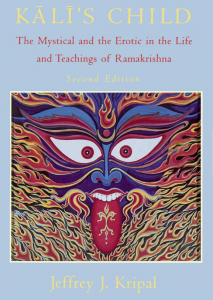 Finally, there is Jeffery Kripal’s book Kali’s Child: The Mystical and the Erotic in the Life and Teachings of Ramakrishna (1995). The book explores and analyzes the “mystical experiences” of the Bengali Saint Ramakrishna against a backdrop of repressed homosexual desire. Here is more than you ever could want to know about this book, its controversy, and the Ramakrishna movement.
Finally, there is Jeffery Kripal’s book Kali’s Child: The Mystical and the Erotic in the Life and Teachings of Ramakrishna (1995). The book explores and analyzes the “mystical experiences” of the Bengali Saint Ramakrishna against a backdrop of repressed homosexual desire. Here is more than you ever could want to know about this book, its controversy, and the Ramakrishna movement.
The lesson? Write your books in the pre-internet age and/or make the controversial topics secondary to generic topics that few will bother to read. On second thought, that didn’t work well for Paul Courtright. However, keep this in mind: book burnings sell books.
So there you have it. We can expect that Lelyveld’s book will continue to get banned in India and he will likely receive death threats from a subsection of zealous right wing Hindus spurred to action by assholes like Modi who is, in turn, inspired by all the trite shit he reads in the Daily Mail or where ever. It doesn’t matter that Lelyveld may or may not have said the things that the reviews claim he did, in the manner that they claim he did (without nuance or context). It is all part of the Cycle of Outrage!
Stay in school kids. Keep reading and be sure to order your books through the Crass Amazon link!

